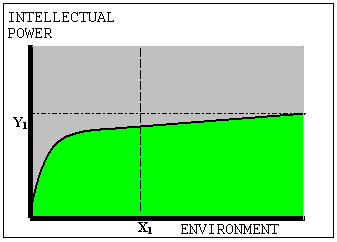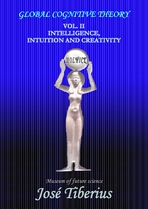4.b) Heredity vs. environment
The following points are in specific groups because it is not easy to separate the arguments in this subject. There is an eternal controversy, both on a personal and political level for philosophical or sociological reasons, either there is no evidence, or not accepted.
The following paragraph, from a study on inheritance in continuous variables, is an example.
Given that there is currently not a definition or an objective measurement of intelligence, it is not reliable to use the methods of quantitative genetics to research the heritability of this characteristic.
Many debates have this common denominator.
4.b.1. Modern materialism
A typical stance refers to the environmental influence on the development of human intelligence; it mentions both the small variations between individuals and in the last thousand years of the human species. Furthermore, they are minimum variances, if we compare them to the differences between the intelligence of diverse species.
This vision of reality is, without a doubt, the greatest obstacle for the acceptance of the Global Cognitive Theory postulates; it deals with a personal attitude impregnated with a kind-hearted egalitarianism and a so-called idealism.
The idea is not necessarily mistaken, but its arguments are not scientific and are slightly contradictory. There is a philosophical correlation between this idealism and egalitarianism and the famous historical materialism.
It is manifest that human intelligence has developed a lot in the last thousands of years. Also, the significant difference between individuals is readily observable.
It could perhaps be much higher than what is politically desirable or people, in general, would like to hear; therefore, it is almost banned in advance to obtain specific measurements of intelligence slightly less relative than the current intelligence quotients. Correspondingly, whatever the results of the studies are, some of them will have a more significant presence in social media.
At the same time, the connotations of a Nazi author when supporting the idea of intelligence being hereditary spreads out. It would be better not to mix politics with science to maintain a healthy scientific point of view.
As this point does not take the deliberation anywhere, it ends with Galileo Galilei's point of view: Although there is a vast difference between man and other animals, we could say that this abyss is no deeper than what separates some men from others. He had his reasons!
4.b.2. Theory of natural selection
A certain degree of intelligence must be hereditary; the visible difference between species of animals makes it palpable.
If it were very similar for all members of one species, it would be very complicated to explain the appearance of new species with highly superior abilities.
The evolution of animal intelligence by random mutations of DNA chains is hardly convincing; it would imply that a personal computer could come from alterations in the molecules in a planet. This argument is another one of the great difficulties in the innate nature of reasoning; it goes against the evolutionary theory of natural selection.
Along these lines, ideas have come up that human intelligence has not changed in the last thousands of years or the lack o using the full potential. Although these ideas only achieve to augment the problem, at some point, intelligence should increase, and logically, it is even more improbable that a more considerable and fast increase will occur by random mutations. However, it is not proving to be problematic; everything eases over time.
Also, the problem would change dimensions because, upon rejecting the random mutations, we would need an alternative model of evolution and Lamarck was not appropriate at the time.
4.b.3. Environment and intelligence
Presumably, environmental conditions should relate to people sharing a living space and other variables.
These interrelations could partially hinder or hide the origin of the capacities studied in multiple regression studies.
The need for specific environmental conditions for human development is another aspect of the present issue. In adverse conditions such as the lack of oxygen during birth, children rose by wolves, alcoholism during pregnancy, meningitis, or other extreme situations, there is no doubt that intellectual potential will be severely affected.
Nonetheless, in the absence of these limitations, the development of the intellectual potential will be slightly less than its maximum. In other words, most of the population in a developed country or a country without grave food shortages will find itself in environmental conditions superior to those corresponding at point X1 of the graph.
The Conditional Evolution of Life section includes a different focus to what is generally said as far as the environmental influence on intelligence. IQ and genetic traits develop mainly throughout individuals' lives, and the improvements go to the offspring.
Two stances with a slightly radical metaphor are: those in favor of the environmental influence on intelligence would say that all birds are born with the potential to fly like an eagle, but some remain as ostriches and others as chickens. On the contrary, the Conditional Evolution of Life would state that the birds are born with a structure and that, of course, healthy growth takes place in practically all of them; they perfect the art of flying during their development, and their offspring will maintain the specific structure of their progenitors.

Consequently, both postures are not so contradictory if we think of them as existing in different scales of the analysis of intelligence. The results of The EDI Study allow some approximation between both perspectives.
4.b.4. Training and IQ testing
An intelligence test is designed to measure specific capacities that hardly increase when doing the test several times. Of course, with intense preparation, the results would be higher; but it would not even be a permanent quality.
A comparison often made to justify the environmental effect on intelligence is how physical exercise changes athletes' performance.
In these instances, the argument is about top-ranking athletes or sports professionals. First, it is not typical for individuals in society to be intelligence professionals like in sports; they seem to earn less. Nevertheless, a large part of the population presumably uses intelligence daily, even though it sometimes may not seem so for some people.
Secondly, aside from exceptions of sports professionals and people who do not exercise at all, the inheritance fundamentally determines a person's speed in a 100-meter flat race, that is, by the physical constitution of each. Of course, unless there is terrible nutrition, which is not very probable in many possible examples.
It would make sense to acknowledge the trouble of comparing the development of any ability with the achievements of professionals. Can the difference in physical strength be justified bearing in mind educational disparities at an early age without straying away from the scientific method?
On the other hand, maybe alcohol, and some traffic accidents would have a similar effect in both cases.
More information on this subject is in the section on the inheritance character of intelligence model of The EDI Study.
